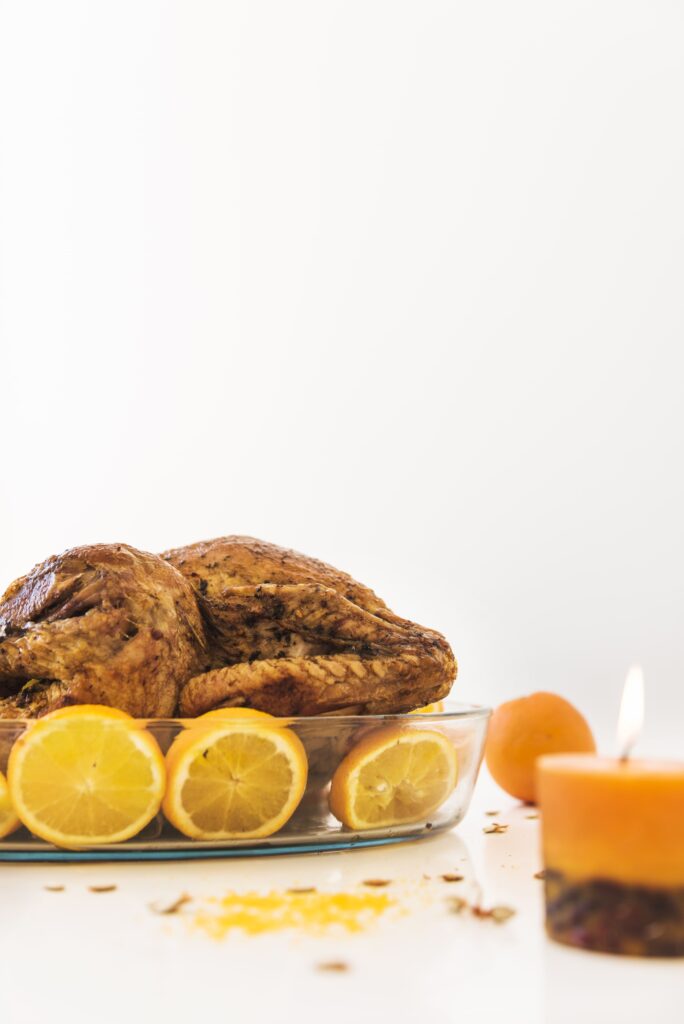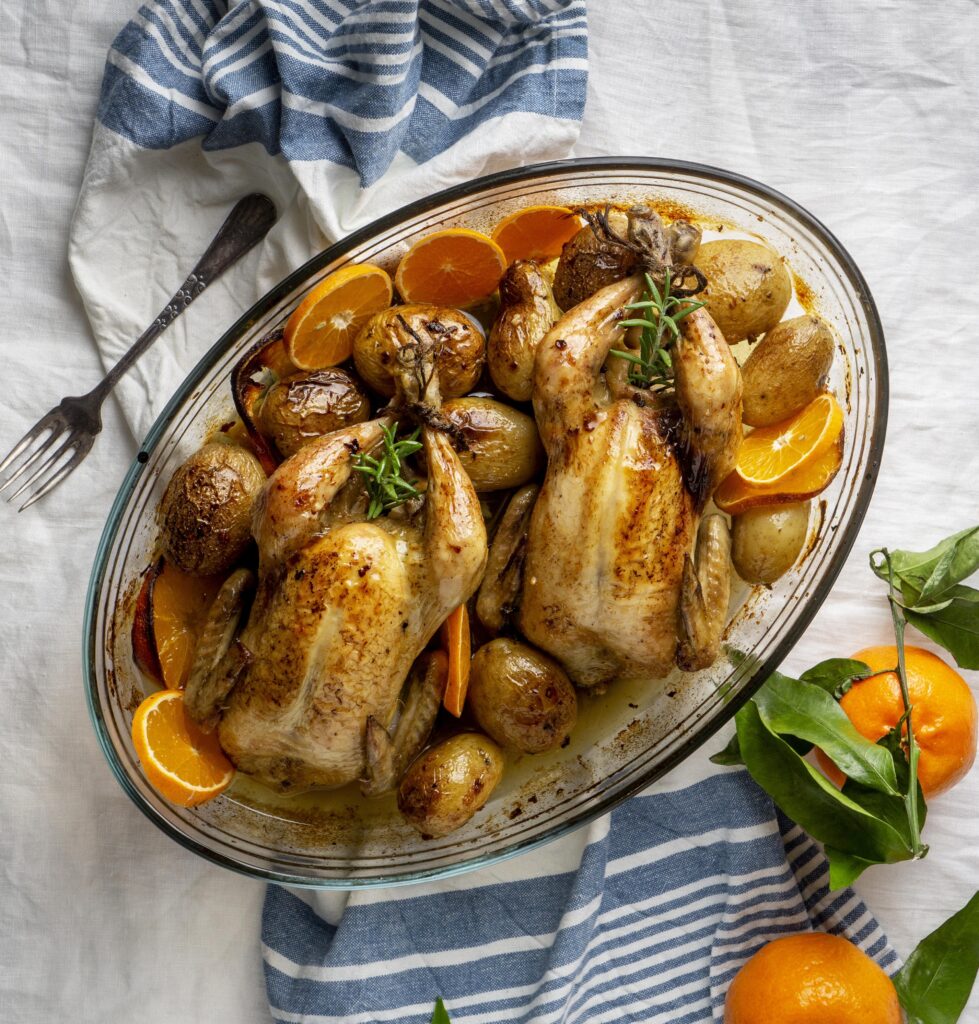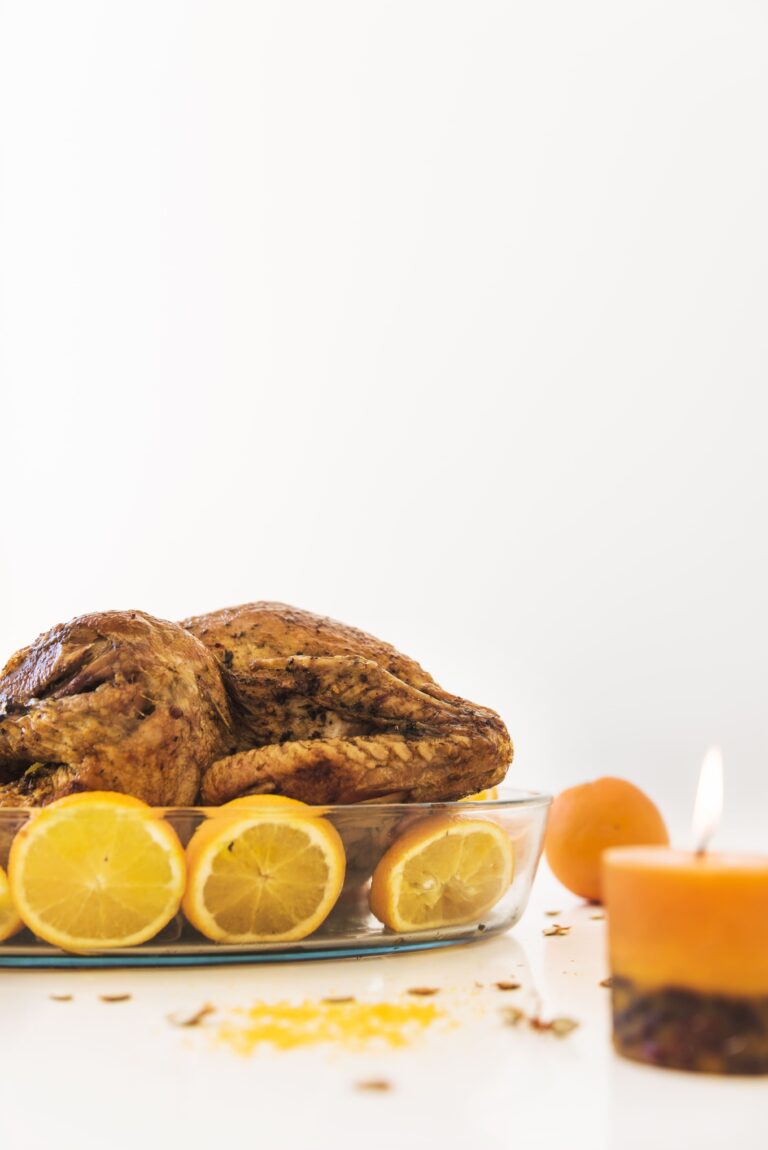Introduction
Roast Duck with Orange is a timeless classic that has graced dining tables for centuries. Its rich, succulent meat, paired with a perfectly crispy skin, makes it a centerpiece dish that is as visually stunning as it is flavorful. Learn more about the history of roasting techniques and why duck is considered a delicacy in many cuisines. Unlike other poultry, duck has a unique depth of flavor—a luscious combination of savory and slightly gamey notes that stand out in any meal.
What makes roast duck truly extraordinary is its versatility when paired with complementary flavors. One of the most iconic combinations is roast duck with orange glaze—a pairing that balances the savory richness of the duck with the bright, tangy sweetness of citrus. This flavor combination has roots in French gastronomy, as highlighted in the famous dish Canard à l’Orange, which symbolizes refinement and sophistication.
In this guide, you’ll find everything you need to create the perfect roast duck with orange glaze. Whether you’re an experienced cook or a novice looking to try something new, this post will provide you with all the tips, tricks, and a foolproof recipe to achieve a restaurant-quality dish at home. From selecting the right ingredients to mastering the art of roasting and glazing, we’ll walk you through every step to ensure your duck is cooked to perfection. So, let’s dive in and discover how to make this showstopping dish that will leave your guests raving!

Why Roast Duck with Orange Glaze Is the Ultimate Dinner Party Dish
When planning a dinner party, choosing the right centerpiece dish can make all the difference. Roast duck with orange glaze stands out as a truly remarkable choice—not just for its flavor, but for the statement it makes. This dish combines culinary sophistication with bold, approachable flavors, ensuring it captivates both the palate and the eye.
The Appeal of Roast Duck
Duck is a culinary treasure, often celebrated for its rich, distinct flavor and luxurious texture. Unlike chicken or turkey, duck has a deeper, more robust taste that carries a subtle gamey note. This flavor profile makes it unique and highly sought after by food enthusiasts. The richness of the meat is complemented perfectly by its crispy, golden-brown skin—a hallmark of well-prepared roast duck. Achieving this balance of tender meat and crackling skin is a rewarding culinary feat that impresses even the most discerning guests.
Roast duck also has a natural elegance that makes it a showstopper at special occasions. Its striking appearance, with a beautifully roasted exterior and a glossy glaze, elevates the dining experience. Serving roast duck creates an atmosphere of indulgence and celebration, making it an ideal choice for holidays, anniversaries, or intimate gatherings where you want to leave a lasting impression.
The Role of Orange Glaze
While roast duck is delicious on its own, the addition of orange glaze transforms it into a symphony of flavors. The bright, zesty notes of orange cut through the richness of the duck, creating a balanced and harmonious dish. The glaze adds a touch of sweetness and a tangy acidity that enhances the savory depth of the meat. The caramelization that occurs during roasting gives the glaze a sticky, luscious quality that clings to the duck, making every bite a delight.
The pairing of orange with duck has historical and cultural significance, particularly in French cuisine. The classic dish Canard à l’Orange (duck with orange) has long been a staple of French gastronomy, symbolizing refinement and sophistication. The combination reflects a perfect balance of sweet and savory, a hallmark of haute cuisine. Beyond France, variations of this pairing appear in other culinary traditions, showcasing its universal appeal.
Incorporating orange glaze into your roast duck recipe not only pays homage to this culinary legacy but also adds a modern twist that is sure to wow your guests. The vibrant, citrusy aroma that fills your kitchen as the glaze cooks is just the beginning—this dish is as much a sensory experience as it is a delicious one. With its perfect balance of flavors, roast duck with orange glaze is the ultimate way to elevate your dinner party to unforgettable heights.
Ingredients You’ll Need for Roast Duck with Orange Glaze
Creating a showstopping roast duck with orange glaze starts with gathering the right ingredients. Choosing high-quality components ensures that every bite of your dish is flavorful, balanced, and memorable. Here’s a detailed breakdown of the main ingredients you’ll need, as well as some optional additions to customize and elevate your recipe.
Main Ingredients
- Whole Duck
- Weight Recommendations: Opt for a duck weighing between 4 to 6 pounds for even cooking and optimal flavor. This size is ideal for serving 4 to 6 people. Look for a duck that has been pre-cleaned, but be prepared to remove any excess fat or giblets.
- Why It’s Important: Duck is the star of the dish, and its rich, fatty meat is what makes it so special. The natural fat layer renders during cooking, keeping the meat juicy while helping to crisp the skin.
- Fresh Oranges and Orange Juice
- Fresh Oranges: Use both the zest and juice for maximum flavor. The zest adds a concentrated citrus aroma, while the juice provides a tangy base for the glaze.
- Orange Juice: For convenience, you can supplement fresh orange juice with store-bought juice, but make sure it’s 100% pure and free of added sugar.
- Why It’s Important: Fresh oranges infuse the dish with bright, natural citrus notes that balance the richness of the duck.
- Honey
- Adds sweetness and helps the glaze caramelize beautifully on the duck’s skin. For a slightly different flavor profile, you can substitute maple syrup or brown sugar.
- Soy Sauce
- Introduces a salty, umami depth to the glaze, enhancing the savory aspects of the dish. If you prefer, tamari or coconut aminos can be used as gluten-free alternatives.
- Other Glaze Components
- White Wine or Vinegar: Adds acidity to balance the sweetness of the honey and richness of the duck.
- Garlic and Ginger: These aromatics provide warmth and complexity, complementing both the duck and the orange flavors.
Optional Ingredients for Variation
- Herbs
- Rosemary, Thyme, or Parsley: Fresh herbs can be stuffed into the duck cavity or added to the glaze for a fragrant, earthy dimension.
- Why They’re Important: These herbs complement the citrus notes while adding depth and freshness to the overall dish.
- Spices for Added Depth
- Cinnamon or Star Anise: These spices bring a subtle warmth and complexity to the glaze, particularly if you’re aiming for a more festive or holiday-inspired flavor.
- Cloves: A small pinch can enhance the orange’s natural sweetness without overpowering the dish.
- Additional Aromatics
- Shallots or Onions: Roasting the duck on a bed of shallots or onions infuses the meat with additional flavor and provides a delicious base for making gravy from the drippings.
- Fresh Ginger or Lemongrass: These can be used for an Asian-inspired twist on the traditional orange glaze.
- Fruit Variations
- Pomegranate Seeds or Cranberries: These can be added to the glaze for a tart and vibrant contrast.
By carefully selecting and preparing these ingredients, you’ll create a roast duck with orange glaze that’s bursting with flavor. Whether you stick to the basics or experiment with variations, these components will set you up for a dish that’s both delicious and unforgettable.

Step-by-Step Guide to Making Roast Duck with Orange Glaze
Cooking roast duck with orange glaze may seem like a daunting task, but with a clear, step-by-step approach, you’ll find it both manageable and rewarding. This section breaks the process into three essential steps: preparing the duck, crafting the orange glaze, and roasting the duck to perfection.
Preparing the Duck
- Cleaning the Duck
- Begin by removing the duck from its packaging and pat it dry with paper towels.
- Remove any giblets or excess fat from the cavity, and reserve them for making stock or gravy if desired.
- Rinse the duck under cold water to remove any residue, then pat dry thoroughly. Dryness is key to achieving crispy skin.
- Trimming and Scoring
- Trim any large pockets of fat around the neck and cavity openings.
- Using a sharp knife, score the skin in a crisscross pattern, being careful not to cut into the meat. This allows the fat to render during cooking and promotes even browning.
- Tips for Crispy Skin
- Air-Drying: After preparing the duck, let it rest uncovered in the refrigerator for 12–24 hours. This removes excess moisture from the skin, ensuring it crisps up beautifully in the oven.
- Seasoning: Rub the duck skin with salt and a pinch of baking powder (optional) to draw out moisture and enhance crispiness.
Crafting the Orange Glaze
- Ingredients for the Glaze
- Fresh orange juice (1/2 cup) and zest of 1 orange.
- 2 tablespoons honey or maple syrup.
- 2 tablespoons soy sauce.
- 1 tablespoon white wine or vinegar (optional for acidity).
- 1–2 cloves of minced garlic and a 1-inch piece of grated ginger.
- Making the Glaze
- Combine all ingredients in a small saucepan over medium heat.
- Simmer the mixture gently, stirring occasionally, until it reduces by about half and thickens to a syrup-like consistency (approximately 10–15 minutes).
- Cooking Tips
- Avoid high heat, as this can cause the sugars in the glaze to burn.
- Taste the glaze as it cooks and adjust the balance of flavors by adding more honey (for sweetness), soy sauce (for saltiness), or vinegar (for acidity).
- Once ready, set the glaze aside and keep it warm for basting during the roasting process.
Roasting the Duck
- Preheating and Preparing
- Preheat your oven to 375°F (190°C).
- Place the duck on a rack in a roasting pan to allow fat to drain away as it cooks.
- Initial Roasting
- Roast the duck breast-side up for approximately 45 minutes. During this time, much of the fat will render, and the skin will begin to crisp.
- Remove the duck from the oven and carefully drain the excess fat from the pan.
- Basting with the Glaze
- Brush the duck generously with the orange glaze, ensuring even coverage on all sides.
- Return the duck to the oven and roast for an additional 30–45 minutes, basting every 10–15 minutes to build layers of flavor and achieve a glossy finish.
- Temperature and Doneness
- Check the internal temperature of the duck with a meat thermometer. The thickest part of the breast should register 165°F (74°C), and the thighs should reach 170°F (77°C).
- If the skin needs more crisping, increase the oven temperature to 425°F (220°C) for the final 10 minutes of roasting.
- Resting and Serving
- Once the duck is fully cooked, let it rest for 10–15 minutes before carving. This allows the juices to redistribute, keeping the meat tender and moist.
Following these steps will ensure your roast duck with orange glaze turns out perfectly every time. The result is a dish that’s rich, flavorful, and visually stunning—a true centerpiece for any occasion.
Frequently Asked Questions about Roast Duck with Orange Glaze
Roast duck with orange glaze is a versatile and flavorful dish, but it can prompt questions for home cooks. This section answers some of the most common inquiries, offering practical advice to ensure your cooking experience is seamless and enjoyable.
Can I Use Store-Bought Orange Glaze?
- Pros of Premade Glaze
- Convenience: A store-bought orange glaze can save time, especially when preparing the dish for a large gathering or on a busy schedule.
- Consistency: Premade glazes are often formulated for balance, ensuring reliable results in terms of sweetness, tanginess, and texture.
- Availability: Many grocery stores carry high-quality glazes, some with unique flavor profiles (e.g., orange and ginger or orange and chili).
- Cons of Premade Glaze
- Lack of Customization: Store-bought glazes may not allow you to tweak the sweetness, acidity, or saltiness to suit your preferences.
- Additives: Many commercial glazes contain preservatives, artificial flavorings, or excessive sugar, which can affect the natural flavor of your dish.
- Cost: High-quality premade glazes can be pricey compared to making your own at home with simple ingredients.
Recommendation: If you’re short on time, store-bought glaze is a viable option, but homemade glaze offers more control and freshness. You can even prepare the glaze in advance and store it for later use.
What’s the Best Way to Store Leftovers?
- Storing Leftovers
- Place leftover duck in an airtight container to prevent it from drying out.
- Store the orange glaze separately to maintain its consistency and prevent the duck from becoming soggy.
- Refrigerate leftovers within 2 hours of cooking, and consume them within 3–4 days.
- Reheating While Maintaining Crispiness
- Oven Method: Preheat your oven to 350°F (175°C). Place the duck on a wire rack over a baking tray and heat for 10–15 minutes. This method helps restore the skin’s crispiness.
- Air Fryer: For quick reheating, an air fryer is an excellent choice. Heat the duck at 375°F (190°C) for 5–7 minutes.
- Avoid Microwaving: While convenient, microwaving can make the skin soggy and chewy.
Pro Tip: If reheating glaze, warm it gently in a saucepan over low heat, adding a splash of water or orange juice to thin it if necessary.
Can I Substitute Chicken for Duck in This Recipe?
- Adjustments for Chicken
- Flavor Profile: While chicken lacks the richness of duck, it pairs well with orange glaze. Use dark meat (e.g., thighs or drumsticks) for a closer match to duck’s robust flavor.
- Cooking Time: Chicken cooks faster than duck. A whole chicken may require 60–75 minutes at 375°F (190°C), depending on its size. Always check for an internal temperature of 165°F (74°C).
- Skin Preparation: Similar to duck, scoring and air-drying the chicken skin can help achieve a crispy exterior.
- Glaze Application
- Chicken’s milder flavor allows the orange glaze to shine. Apply the glaze during the final 15–20 minutes of cooking to prevent burning.
- Portion Flexibility
- Chicken breasts, thighs, or wings can be glazed individually, making the dish easier to portion and serve for smaller gatherings or weeknight meals.
Pro Tip: While chicken is a good substitute, turkey or Cornish game hens can also be used for a dish that’s closer to duck in richness and presentation.
Conclusion
Roast duck with orange glaze is more than just a dish—it’s an experience that combines bold flavors, elegant presentation, and a touch of culinary sophistication. From the crispy, golden-brown skin to the tender, flavorful meat, every bite is a testament to the beauty of thoughtful cooking. The vibrant orange glaze ties the dish together, balancing the richness of the duck with its sweet and tangy citrus notes, making it a perfect centerpiece for any occasion.
Whether you’re hosting a holiday feast, celebrating a special event, or simply treating your family to something extraordinary, this dish is sure to impress. Its versatility allows for creative variations, while its timeless flavor profile guarantees universal appeal. The steps and tips in this guide ensure that even novice cooks can achieve stunning results, making roast duck with orange glaze a recipe worth mastering.
We hope this guide has inspired you to try making this classic dish at home. If you do, we’d love to hear about your experience! Share your thoughts, tips, or any twists you added to the recipe in the comments below. Did you use a unique spice blend? Pair it with a standout side dish? Let us know how it turned out!





